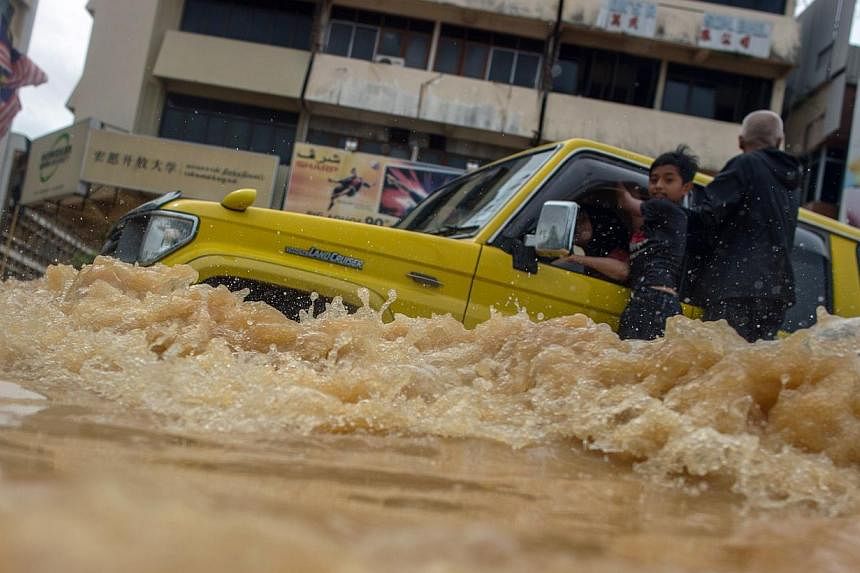As we bid farewell to 2014, it is time to anticipate what the new year will bring.
The past year brought tragedy, hardship and tears to Malaysians, who experienced two aircraft tragedies and the worst floods in decades.
There are still no answers to what happened to MH370, MH17 and Indonesia AirAsia Flight QZ8501. The first unfinished business in the new year is to clear up the mysteries.
The truth as to the Indonesia AirAsia plane crash may soon be found, together with the black box. What and who brought down MH17 are questions still mired in the politics of Ukraine. As for MH370, hopefully it will be found in the new year.
Thus our biggest wish in 2015 is to have the truth revealed on all three airline tragedies and bring final closure for the families and the nation.
The new year will also be a big test for the revamping of Malaysia Airlines. May that exercise go well.
Statistics tell us that it is safer to fly than drive. That drives home the point that the thread of our lives is fragile indeed. Road accidents claimed the lives of thousands, including MP Karpal Singh in 2014.
A sombre mood descended on the nation when the east-coast states were flooded out as the year ended. As flood waters recede, the first task of 2015 will be to rebuild the houses, schools, roads, bridges and buildings that were destroyed or damaged.
The motto for 2015 should be: "Be Prepared." Or "Be better prepared".
There will be more floods, and in more places, and the lesson of 2014 is that we have to build better drainage and other flood-prevention infrastructure, and more effective rescue and rehabilitation operations, as well as be much more serious about preventing forest and hill clearance.
As the Cameron Highlands landslides teach us, deforestation and hillside land mismanagement can devastate entire neighbourhoods and regions.
The heavier rains over Malaysia are part of the pattern in Asia of increased storms and rainfall in recent years that have caused great damage in the Philippines, Indonesia, Thailand, Pakistan, China and India.
This is likely linked to climate change. As the oceans warm, there is more evaporation and increased water vapour in the atmosphere, which is downloaded as heavier rainfall, causing devastating floods.
According to climate science reports: "Changes are occurring in the amount, intensity, frequency and type of precipitation… Widespread increases in heavy precipitation events have been observed. These changes are associated with increased water vapour in the atmosphere arising from the warming of the world's oceans."
Since global warming will get worse, the recent floods should be taken as an early warning, and disaster preparedness should be given utmost priority. It is not just the floods, but the AirAsia crash as well, that is linked to bad weather and storm clouds.
If man-made and natural disasters have made us sombre at the start of 2015, the new year will also bring huge economic challenges. This will reflect the fragility of both the global economy and the state of the Malaysian economy.
There are good and bad signs, but overall the bad seems to outweigh the good.
The United States economy is recovering fast, and that should add to global demand. But this will also prompt US interest rates and the dollar to rise, and the billions of dollars that left the US in search of profit will return to it.
In December alone, investors pulled out US$11.5 billion (S$15.3 billion) of funds from developing countries, according to the International Institute of Finance.
In 2015, developing countries like Malaysia that received huge inflows of funds will face a reverse flow.
Malaysia is among the vulnerable countries because of the high foreign stakes in the two portfolio categories of government bonds and equities.
According to reports in The Star last month, foreigners brought in RM139.9 billion (S$52.8 billion) in net portfolio funds since the 2008-2009 crisis.
At the end of September last year, they owned at least RM140 billion worth of government bonds, or 46 per cent of the total. In recent weeks, they sold quite a bit of their bonds, and some economists suggest that as much as half of their funds could eventually flow out.
Foreigners also held 23.6 per cent of the value of Malaysian equities as at end-November. They sold a net total of RM2.83 billion of these equities last month, and a net total of RM6.8 billion for the year 2014, according to a report in the New Straits Times last Thursday.
The funds outflow is causing a decline in the ringgit's exchange rate and a deterioration in the balance of payments.
The ringgit decline has good effects (it makes our exports cheaper and thus more competitive, and it may also increase our commodity export prices in ringgit terms) and bad effects (it makes imports more expensive and external loans contracted in US dollars more expensive to service).
The weakening of the ringgit also contributes to further outflow of funds since people expect the ringgit to decline further.
The year 2015 will also be affected by the decline of the oil price, now at below US$60 a barrel. This has some positive effects (lower petrol prices, which is good for consumers and the airline industry) but also major negative effects because Malaysia is a net oil exporter.
Oil export earnings will go down, and so will government revenue since about a third of the total is derived from oil. That may force the government to increase its borrowing, or reduce its expenditure, both of which have bad effects.
All these uncertainties make for a fragile domestic economy this year.
Thus, this will be a most challenging year. Many things taken for granted cannot be so taken any more.
It is best to "be prepared" for more sombre times ahead.
THE STAR/ASIA NEWS NETWORK

